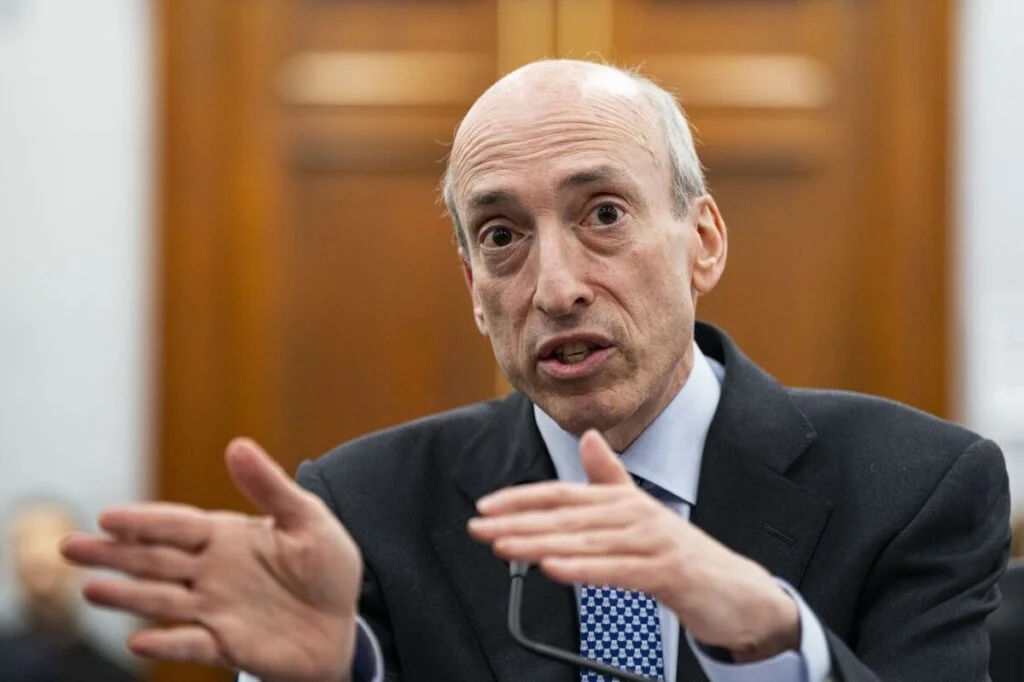SEC Chair Gary Gensler talks about the launch of spot Bitcoin ETFs, the irony of centralizing a decentralized system, and the challenges of crypto regulation.

Gary Gensler, the head of the U.S. Securities and Exchange Commission (SEC), has shared his thoughts on the newly launched spot Bitcoin exchange-traded funds (ETFs) and the future of crypto regulation. He also addressed the concerns raised by Senator Elizabeth Warren, who criticized the SEC’s decision to approve the ETFs.
The Irony of Spot Bitcoin ETFs
The spot Bitcoin ETFs, which track the price of the world’s largest cryptocurrency and hold actual bitcoins in custody, have received the long-awaited approval from the U.S. regulators, opening up new opportunities for investors and the crypto industry. However, Gensler pointed out the irony of this development, noting that it contradicts the original vision of Bitcoin’s creator, Satoshi Nakamoto, who envisioned a system for electronic transactions that would operate independently of centralized financial institutions.
In an interview with CNBC, Gensler said that the launch of spot Bitcoin ETFs appears to centralize what was intended to be a decentralized system. He said that ETFs are intermediaries that charge fees and are subject to regulation, while Bitcoin was designed to eliminate intermediaries and fees.
Not an Endorsement, But a Sustainable Path Forward
Despite approving the ETFs, Gensler quickly clarified that this action does not imply the SEC’s endorsement of Bitcoin. He said that the SEC did not approve or endorse Bitcoin itself, which he described as a “speculative, volatile asset” that poses various risks to investors. He also said the SEC’s approval was based on the legal and policy framework that governs the ETFs, not the underlying asset.
Gensler said that the SEC determined that the approval of the ETFs was the “most sustainable path forward” for the crypto market, as it provides a regulated and transparent product for investors who want exposure to Bitcoin. He said that the SEC’s decision was influenced by the court ruling in 2022 that rejected the SEC’s attempt to block Grayscale’s Bitcoin Trust (GBTC) from becoming an ETF.
Since their introduction, the spot Bitcoin ETFs have seen significant trading volumes, surpassing $6 billion.
Gensler, who has an academic background in blockchain technology from his time at the Massachusetts Institute of Technology, acknowledged the innovative aspects of blockchain and its potential impact on ledger systems. He said that the SEC is open to facilitating innovation but also has a duty to protect investors and markets.
Addressing Senator Warren’s Concerns
Senator Elizabeth Warren, who voted for Gensler’s nomination as SEC Chair, recently expressed her concerns about the SEC’s decision to approve the spot Bitcoin ETFs. She said that the SEC’s legal and policy approach regarding the ETFs was “inadequate” and “dangerous.” She emphasized the urgency for crypto-assets to adhere to basic anti-money laundering regulations, especially as they become more integrated into the financial system.
In response, Gensler expressed deep respect for those holding opposing views, including Senator Warren. He underscored his commitment to respecting the law while navigating the complex landscape of cryptocurrency regulation. Gensler’s stance indicates an awareness of the need to balance innovation in the crypto sector with regulatory compliance and investor protection.
He also said that the SEC is working with other regulators, such as the Treasury Department and the Commodity Futures Trading Commission (CFTC), to address the challenges the crypto market poses. He said that the SEC is looking into various issues, such as custody, market manipulation, fraud, investor education, and environmental impact.
The Possibility of a Spot Ethereum ETF
The conversation also touched upon the possibility of a spot Ethereum ETF, which would track the price of the second-largest cryptocurrency and hold actual ether in custody.
Gensler clarified that the SEC’s recent decision was specific to Bitcoin, which he described as a “non-security commodity token.” He said that the SEC has not received any applications for a spot in Ethereum ETF and that the SEC would evaluate any such applications based on the facts and circumstances of each case.
The SEC’s Chair also said that the SEC views most other cryptocurrencies, such as stablecoins and tokens issued in initial coin offerings (ICOs), as securities that fall under the SEC’s jurisdiction. He said that the SEC is concerned about the lack of compliance and transparency in the crypto space and that the SEC is pursuing enforcement actions against violators.
